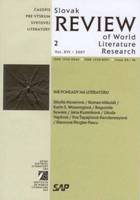K niektorým etickým aspektom radikálneho konštruktivizmu
ON SOME ETHICAL ASPECTS OF RADICAL CONSTRUCTIVISM
Author(s): Roman MikulášSubject(s): Literary Texts
Published by: SAV - Slovenská akadémia vied - Ústav svetovej literatúry
Keywords: Ethics; Constructivism; Autopoiesis; System Theory; Circular Logic; Anormative Ethics
Summary/Abstract: Radical constructivism pleads to be and makes itself legitimate mainly as an epistemological position which orients the scientific research towards inner consistency of cognitive performances, i.e. of human knowledge, and simultaneously has crucial implications for specific scientific disciplines. It is one of the elementary conditions of a potential discussion about the ethics of constructivism because according to the constructivist theories the individual is not able to make decision alone and freely, or in other words, one is not able to act „rationally“ as an individual. Radical constructivism postulates an anormative ethics which presupposes a question whether such an ethics can be pursued at all if its theoretical postulate itself implies a radical paradox as its existential principle, i.e. an ethics which per se undermines the basic principle of philosophical ethics which is based on the establishment and legitimation of norms. In the case of anormative ethics one can assume the principle of implicit normativeness which is based on the conception of autopoietic systems. The rejection of the dogma of truth, therefore, does not necessarily lead to the ethical disorientation or arbitrariness as it is associated with the postmodern. The ethical consequence rests on the assumption that the actively construing individual bears the responsibility for all cognitive performances because every quality of the cognitive system is a product of its structural dynamics.
Journal: Slovak Review of World Literature Research
- Issue Year: 2007
- Issue No: 02
- Page Range: 18-34
- Page Count: 17
- Language: Slovak

